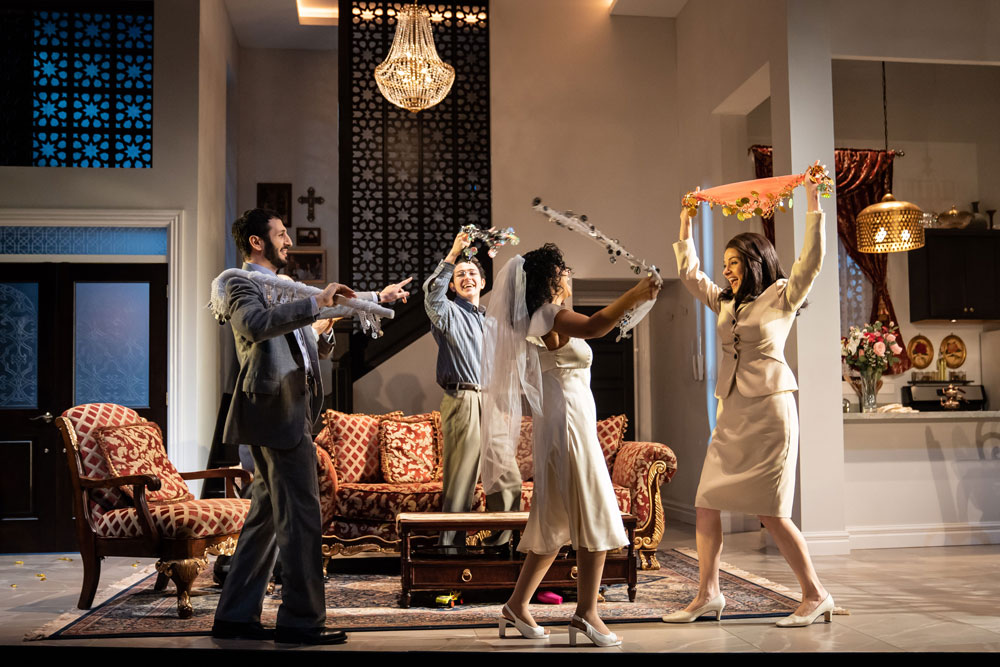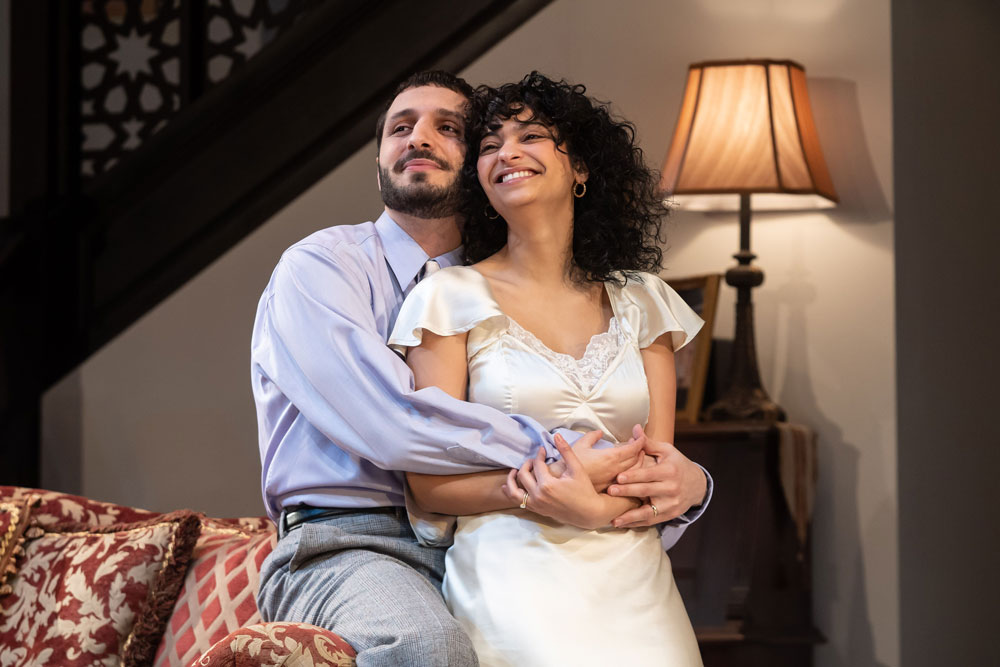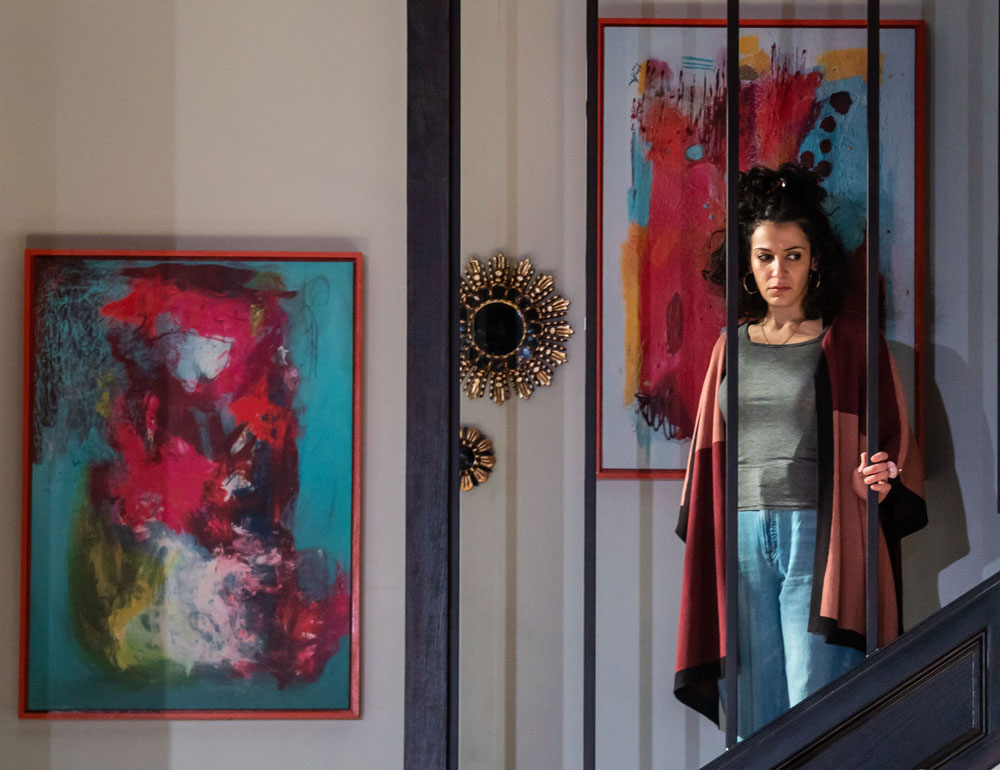
Despite the brittle and bitter reality of America’s political divide, the US still attracts throngs around the world in need of refuge. Whether it be from economic instability or stiffling autocracy, people migrate to this and other democracies in search of a future. Always tucked within that search is also a wish for personal autonomy.
Beyond headlines and the purview of intense political scrutiny, the immigrant story now playing in the Goodman’s Owen Theater is not one most of us know well or at all. Despite that, the factors that drove the Ibrahim family from Baghdad and to the lives they created for themselves in suburban Skokie highlight the essentiality of basic human freedom.
We meet them in the throes of joy. Sweeping through their front door following the wedding of Layal (Becca Kahlil), the family’s oldest daughter, the mood is wonderfully exuberant, warm and comfortable. Chic and serenely beautiful, the space they inhabit once they enter the room radiates affluence as expressed through a contemporary Assyrian lens. Elegant, substantial and pleasing. Without a hint of discord in their exchanges, the dialogue between them makes it clear this is a family whose love for one another is deep and strong.

Outside the home, instability rages. It’s the early 2000s and anger with the Iraqi regime fill the streets with protests. Despite his ties to the government responsible for much his success, the patriarch, Yasir has been working quietly and desperately to get his family out of the country. Exposing that effort, and the way it telegraphs the resolve to live freely, are two of the most satisfying aspects of Layalina. As Yasir, Mattico David marvelously conveys the kind of love that drives a father to accept harrowing risks to save his family. Learning not only his new son-in-law, Sahir (Waseem Alzer) and son, Mazin (Ali Louis Bourzgui) are involved in the protests; but also that his daughter Layal has been joining them in the streets, only spur his efforts. As it does in Layalina, fate can alter the nimblest of plans. But for Yasir and his wife Karima (Ata Asdou) it didn’t change the endgame’s imperative.
A before and after tale about a single family, Layalina looks at the kind of investments needed to keep any family whole. Created by playwright Martin Yousif Zebari, it also revels in how receptive genuine freedom is to personal expression and identity.
When the second act opens, it’s seventeen years later and Layal’s heading a household alone in Skokie. With her are her younger brother Yousif (Ali Louis Bourzgui) and Marwa (Becca Kahlil), who were only five and six when they left Iraq to live with her in America. Amin (Waseem Alzer), her deceased husband’s brother is also living with the family. Because we see more of her essence during the second act, we get a much greater understanding of who Layal (Atra Asdou) has become after almost twenty years away from her homeland. And we see how growing up in America has altered the direction of her brother and sisters lives.

The play employs double casting; requiring each actor play a different role in the second part of the production. They all shine in both. But without a firm recall of how each character relates and connect to one another during the first half of the play, the audience might lag in understanding who’s who in the second act. The dynamics of the story eventually clarify associations but the confusion makes the transition less effective than it could be.
If dramatic anticipation defines the first act, richness of character fills the second. With a clothing design business she’s running out of her home, Layal’s independent, strong willed and centered. As leader of the Ibrahim family in America, she wears the mantle of provider with purpose and accepts the sacrifices the role entails. That streak of self-determination glimpsed in the first act now burns like a steady flame. And, along with love, it may be one the things that feeds her tolerance. Amin doesn’t faze her. As gay and nearly as funny as Randy Rainbow, Amin’s overall ambitions in life may seem ambiguous but there’s no questioning the soothing effect of his presence. Her brother Yousif, now out of college and working as a successful graphic designer in London, is home visiting. Also gay, his sexuality is not something you see or hear in the way he presents. Nor is it something he hides. Out long enough for it to be considered pro forma, he’s just a brother confident in the love of his sister. Marwa’s the person who stands as Layal’s acceptance challenge. Her younger sister’s sexual ambiguity is harder for her to fully process.

When Mazin (Mattico David) visits from Australia and all four of the Ibrahim siblings are reunited, sexual identity never rises as a critical concern. The brothers and sisters are much more intent on learning how they can tighten the bonds between one another. Despite the barriers of geography and the demands that come with pursuing personal ambitions, the benefits derived from a caring and supportive family is what they ultimately want to strengthen and preserve. That their dilemma resolves a little too neatly turns out to be a very minor offense. It’s the play’s overriding endorsement of family as a place of constancy, purpose and shelter that secures its value.
Layalina
March 3 – April 2, 2023
Goodman Theatre
170 N. Dearborn Street
Chicago, IL 60601